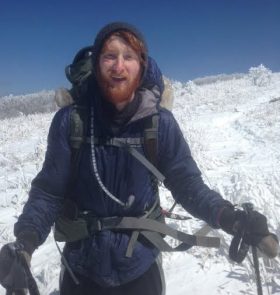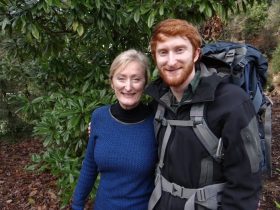Alumnus Johnny Morris ’14 hiked the Appalachian Trail to raise money and awareness for Alzheimer’s disease.

Morris had always wanted to hike the trail, and the company’s 15th anniversary gave him all the motivation he needed. Nearly half the patients involved in MemoryCare are considered low income, and he has raised enough money to cover the costs for 40 families for the entirety of 2016. “Choosing to do this for MemoryCare is my way of giving back to a small community that has given so much of itself to help those who need it,” he says.
The trail, which spans some 2,200 miles from Georgia to Maine, provides a different challenge. Morris says the walk has taught him patience, awareness and perseverance. The hike garnered attention from companies such as Vasque, NEMO, Darn Tough, Leki and Osprey, who sponsored Morris by giving him gear for his journey. “To finish a long-distance hike such as this is an incredibly rewarding experience, but to do so while giving back is truly a once in a lifetime opportunity,” he says.
His mother, Dr. Margaret Noel, who has worked with Alzheimer’s patients for the past 25 years, started MemoryCare in 2000. She taught Morris the important role family members play when treating dementia patients, particularly when it comes to ensuring quality of life. MemoryCare staff devote nearly as much time educating caregivers about the disease as they do working with actual patients.

As a young person advocating for dementia awareness, he has been able to gain traction on social media throughout the hike. “It has brought awareness to Millennials who probably don’t realize how this disease is impacting their parents and their grandparents and will impact them at some point,” says Chad Conaty, director of development and Outreach for MemoryCare. As a result, MemoryCare has seen growth on Facebook, going from 20 likes to 300 over the course of Morris’s hike.
Morris realizes the hike, which he completed in July, is just the beginning when it comes to raising awareness for Alzheimer’s. “Discovering a cure will require recruiting young scientists to become interested enough to build upon what has been done by the generation ahead of us,” he says. “We need to be educated and prepared to help people with Alzheimer’s to have the best quality of life possible.”
By Kyle Lubinsky ’17


